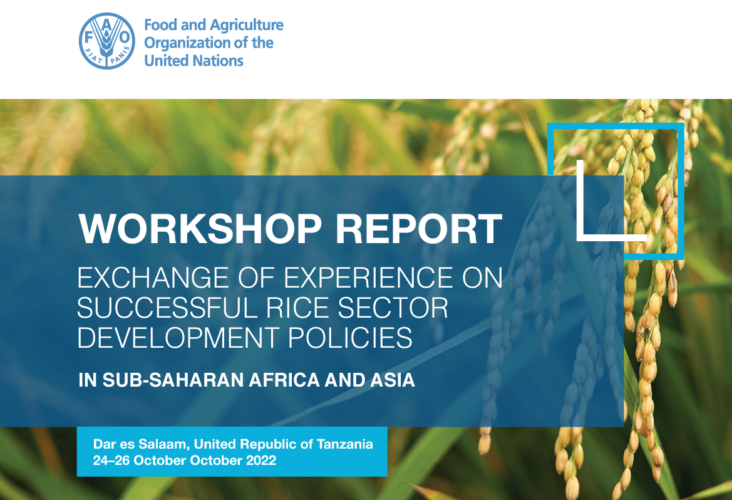In the pursuit of global food security and sustainable agricultural practices, rice plays a vital role as a staple crop, particularly in regions like Sub-Saharan Africa and Asia. Recognizing the significance of rice sector development in these areas, The Food and Agriculture Organization of the United Nations (FAO) organized a momentous regional rice policy workshop titled “Exchange of Experience on Successful Rice Sector Development Policies in Sub-Saharan Africa and Asia.” The workshop took place in Dar es Salaam, United Republic of Tanzania, from 24th to 26th October 2022, bringing together policymakers and technical experts from selected countries in both continents. The primary goal of the workshop was to foster the exchange of policy and institutional experiences in rice value chain development, laying the foundation for fruitful cooperation between Asian and Sub-Saharan African institutions in promoting a sustainable, innovative, inclusive, and efficient rice sector.
With a clear focus on knowledge exchange and collaboration, the workshop attracted the participation of 30 distinguished policymakers and technical experts. The countries represented included Benin, Côte d’Ivoire, Ghana, Mali, Senegal, Sierra Leone, Uganda, India, the Republic of Korea, Thailand, and Viet Nam. Moreover, esteemed organizations and regional bodies such as AfricaRice, the Coalition for Africa’s Rice Development (CARD), the International Rice Research Institute (IRRI), the Rice Observatory of the Economic Community of West African States (ECOWAS), Common Market for East and Southern Africa (COMESA), and the East African Community (EAC) actively contributed to the discussions.
The regional workshop culminated in a set of comprehensive recommendations aimed at promoting a sustainable, innovative, inclusive, and efficient rice value chain in Sub-Saharan Africa. Emphasizing the importance of collaboration and knowledge-sharing, the participants acknowledged the significance of South-South cooperation between the two regions.
The recommendations covered a wide range of areas, including strengthening research and development initiatives, enhancing access to improved rice varieties, promoting sustainable agricultural practices, and fostering market linkages. Furthermore, it underscored the necessity of policy support and institutional capacity-building to ensure the successful implementation of these initiatives.
The FAO’s regional rice policy workshop proved to be an invaluable platform for policymakers and technical experts from diverse backgrounds to come together, exchange experiences, and envision a shared path towards sustainable rice sector development. The insights and recommendations generated during this collaborative endeavour will undoubtedly contribute to shaping a more resilient, inclusive, and sustainable rice value chain in Sub-Saharan Africa and Asia.
Publication Download
To delve deeper into the themes, topics, and recommendations discussed during the workshop, the full report can be downloaded here.

